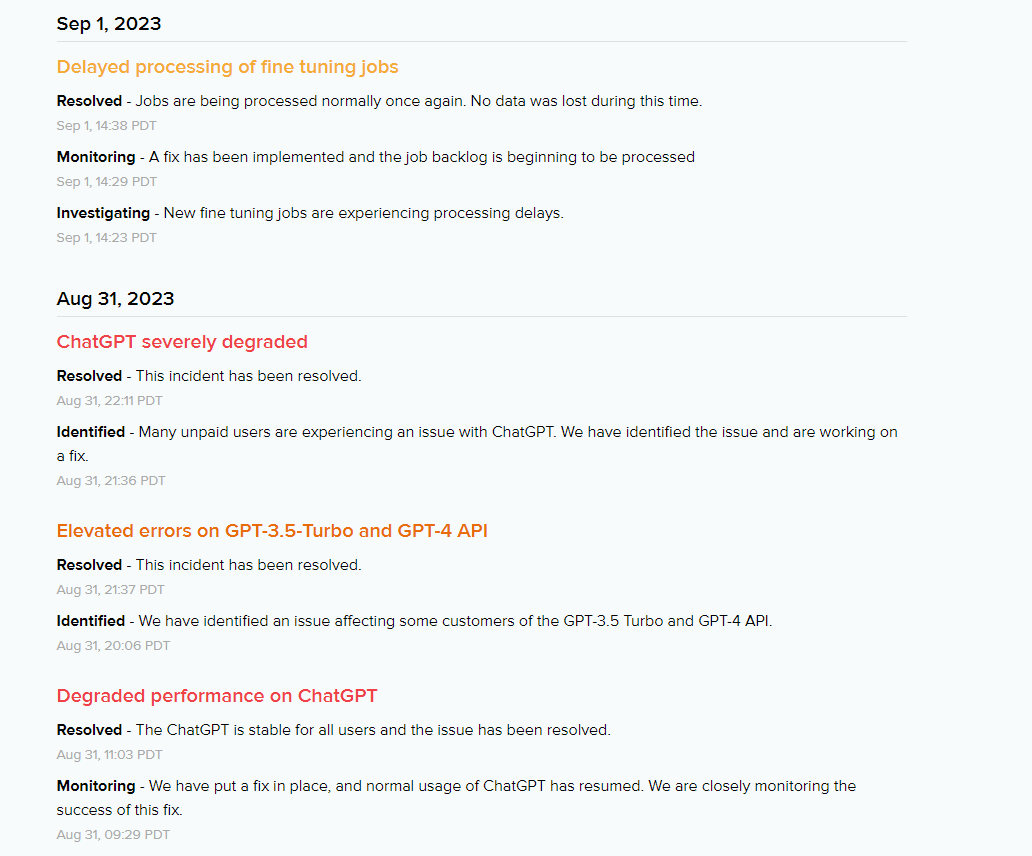
ChatGPT, a product of OpenAI’s innovative endeavors, has emerged as a leading figure in the realm of conversational AI. This advanced language model has transformed our digital interactions, bridging the gap between human intuition and machine intelligence. Users across the globe, spanning professions from academia to business, have integrated ChatGPT into their daily tasks, leveraging its capabilities for content generation, query resolution, and more.
ChatGPT Down has become all too familiar for some users. As with any digital platform, ChatGPT is not exempt from occasional downtimes. These interruptions, while infrequent, can pose challenges for its vast and growing user base, prompting discussions and searches among those seeking solutions during these brief outages.
In this article, we delve deep into the intricacies of such downtimes, aiming to provide clarity on their causes, ways to ascertain their occurrence, and potential workarounds or alternatives to ensure uninterrupted productivity.
Why is ChatGPT down?
The first and foremost reason for ChatGPT’s downtime can often be attributed to server maintenance. As technology evolves and as OpenAI continues to refine and upgrade its systems, periodic maintenance becomes essential. This ensures that the platform remains up-to-date, secure, and efficient. However, such updates, while crucial for long-term stability and performance, might require temporary suspension of services.
Another significant factor leading to ChatGPT Down scenarios is the sheer volume of traffic. With its growing popularity, there are times when an overwhelming number of users access the service simultaneously. This sudden surge can strain the servers, leading to temporary outages. It’s akin to a traffic jam on a busy highway; even the most robust systems have their limits when faced with an unexpected influx of requests.
Lastly, unforeseen technical glitches or external factors can also play a role. These can range from bugs in the system, issues with the broader internet infrastructure, or even external cyber-attacks. While OpenAI employs stringent measures to prevent such occurrences, the intricate web of digital interactions means that occasional disruptions are, unfortunately, inevitable.
How to Check ChatGPT Down?
In the digital age, when a service like ChatGPT becomes temporarily inaccessible, it’s natural to wonder if the issue is on your end or if it’s a broader problem. Fortunately, several tools and platforms can help users determine if ChatGPT down. These tools range from official status pages to third-party websites that gather user-reported issues. By leveraging these resources, users can quickly ascertain whether ChatGPT is experiencing a widespread outage or if the problem might be localized to their own connection or device.
OpenAI Status Page: This is the primary and most reliable source of information regarding ChatGPT’s operational status. The official OpenAI status page provides real-time updates on various functions of ChatGPT. If there’s an ongoing issue, it will typically be highlighted here, along with any official statements or expected resolution times.
Downdetector: Downdetector is a third-party platform that aggregates user reports to identify potential outages across various services, including ChatGPT. If a significant number of users report issues within a short time frame, it’s a strong indicator of a broader problem. Additionally, Downdetector offers a historical data feature, allowing users to see past outages and their durations.
Twitter: Social media, especially Twitter, has become a real-time news source for many. When widespread issues occur, users often take to Twitter to share their experiences or seek solutions. By searching for terms like ChatGPT Down or checking OpenAI’s official Twitter handle, one can gauge if there are widespread reports of issues.
By cross-referencing these tools, users can get a comprehensive view of ChatGPT down and determine the best course of action, whether it’s waiting for a resolution or troubleshooting potential issues on their end.
What to Do If ChatGPT is Down?
When faced with a “ChatGPT Down” situation, it’s essential to have a proactive approach to either find a workaround or wait it out effectively. While it can be frustrating to encounter such interruptions, especially if you’re in the middle of an important task, understanding the steps to take can alleviate some of the stress and help ensure you’re back on track as soon as possible.
Wait and Try Again:This is the simplest and often the most effective solution. Many downtimes, especially those due to maintenance or minor glitches, are temporary.
- Action Steps: Close the ChatGPT application or browser, wait for a few minutes, and then try accessing the service again.
Check Official Sources:OpenAI often provides updates regarding any ongoing issues or maintenance on their platforms.
- Action Steps: Visit the OpenAI status page or their official social media channels, especially Twitter, to see if there are any announcements or updates related to the downtime.
Clear Browser Data:Sometimes, the issue might be due to cached data in your browser, which can cause conflicts or prevent access.
- Action Steps: Go to your browser settings, find the option to clear browsing data (this usually includes cached images and files, cookies, and other site data), and then try accessing ChatGPT again.
Use a Different Browser or Device:Occasionally, the problem might be specific to a browser or device.
- Action Steps: Try accessing ChatGPT from a different browser or even a different device to see if the issue persists.
Check Your Internet Connection:A stable internet connection is crucial for accessing online services like ChatGPT.
- Action Steps: Ensure you’re connected to the internet, try accessing other websites to check if they’re loading, or consider restarting your router.
Seek Community Help:The ChatGPT and OpenAI community can be a valuable resource. Often, other users might have faced similar issues and can offer insights or solutions.
- Action Steps: Visit forums, community pages, or platforms like Reddit to see if others are discussing the same issue and if there are any recommended fixes.
By following these steps, users can either resolve the issue on ChatGPT down or, at the very least, gain a clearer understanding of the nature of the downtime, allowing them to plan their tasks accordingly.
Top Causes of ChatGPT Downtime and Their Solutions
Understanding the potential reasons behind ChatGPT Down and their corresponding solutions can help users navigate these interruptions more effectively. Here, we delve into the most common causes and provide actionable steps to address or mitigate their impact.
Server Maintenance:
- Description: Regular updates or infrastructure improvements might necessitate temporary service suspension to ensure the platform remains up-to-date and secure.
- Solution: While users cannot expedite maintenance processes, it’s advisable to check the estimated time of resolution provided by OpenAI and plan tasks accordingly. Using ChatGPT during off-peak hours might also reduce the chances of encountering maintenance-related downtimes.
High Traffic:
- Description: During peak usage times, a sudden surge of users can strain the servers, leading to temporary outages.
- Solution: If possible, try accessing the service during off-peak hours. Additionally, keeping an eye on the OpenAI status page can provide insights into server load and optimal usage times.
Technical Glitches:
- Description: Unexpected errors or bugs can cause disruptions in the service.
- Solution: Clearing the browser cache or using a different browser might help. If the issue persists, it’s best to wait for a while and try again, as OpenAI usually addresses such glitches promptly.
Network Issues:
- Description: Problems with the broader internet infrastructure, such as ISP outages or regional disruptions, can affect access to ChatGPT.
- Solution: Check your internet connection by trying to access other websites. If they’re also inaccessible, consider restarting your router or contacting your ISP for more information.
External Attacks:
- Description: On rare occasions, cyber-attacks targeting OpenAI’s infrastructure can lead to service disruptions.
- Solution: In the event of a cyber-attack, the best course of action is to stay updated through official channels. OpenAI will likely provide information on the situation and the estimated time for resolution.
By being aware of these common causes and their solutions, users can take proactive measures to minimize disruptions and continue their work with minimal hindrance.
Last 3 Times ChatGPT Down
Understanding the history of ChatGPT’s downtimes can provide insights into the platform’s stability and the nature of issues it has faced. Here’s a detailed look at the last three significant downtimes:
August (specific date not provided):
- Duration: Approximately 1 hour and 45 minutes.
- Cause: The downtime in August was primarily due to a scheduled server maintenance. OpenAI aimed to implement crucial updates to enhance the system’s performance and security.
- Resolution: OpenAI successfully completed the maintenance within the stipulated time and ensured that all functionalities were restored promptly. Users were advised to clear their browser cache if they faced any lingering issues post-maintenance.
Tuesday, May 23, 2023:
- Duration: About 33 minutes.
- Cause: This interruption was attributed to an unexpected surge in traffic, likely due to a global event that increased the demand for AI-generated content.
- Resolution: OpenAI’s engineering team worked diligently to scale up the server capacity. They also released a statement acknowledging the issue and assuring users of their commitment to preventing similar occurrences in the future.
Friday, September 1, 2023:
- Duration: Roughly 2 hours.
- Cause: This downtime was a result of a combination of factors, including technical glitches and a minor cyber-attack attempt.
- Resolution: OpenAI’s cybersecurity team quickly thwarted the attack, ensuring no data breaches. Concurrently, the technical team addressed the glitches, and the service was restored. OpenAI also took this opportunity to reinforce its security measures, further safeguarding user data and ensuring platform integrity.
By analyzing these instances, users can appreciate OpenAI’s proactive approach to addressing issues and their commitment to ensuring ChatGPT remains a reliable tool for its vast user base.

ChatGPT Alternatives
In the rapidly evolving domain of conversational AI, several platforms have emerged as competitors to ChatGPT. While each has its unique strengths and features, they all aim to provide users with coherent, context-aware responses. Here’s a closer look at three notable alternatives:
Microsoft’s Bing Chat: Bing Chat is an AI chatbot integrated into the Bing search engine. Developed by Microsoft, it combines the power of Bing’s search capabilities with conversational AI, offering users a seamless experience.
- Use Cases: It’s especially useful for those seeking quick answers, blending the benefits of a search engine with the interactivity of a chatbot.
Google BARD: Not to be confused with BERT, Google BARD is a conversational AI model designed to provide coherent and context-aware responses. It’s a testament to Google’s commitment to advancing the field of natural language processing.
- Use Cases: BARD is suitable for a range of tasks, from chatbot interactions to content generation, and offers deep contextual understanding.
Claude: Claude is a newer entrant in the conversational AI space. While not as widely recognized as the other two, it has garnered attention for its advanced algorithms and user-friendly interface.
- Use Cases: Claude is ideal for businesses looking for a customizable chatbot solution that can be tailored to specific industries or user needs.
Each of these alternatives offers a unique approach to conversational AI, and users might find one more suited to their specific requirements than the others. Exploring them can provide a comprehensive view of the current state of chatbot technology.
Conclusion
ChatGPT Down is a reminder of the complexities inherent in maintaining and operating cutting-edge digital platforms. While ChatGPT has revolutionized the way we interact with AI, it’s essential to recognize that even the most advanced systems can face challenges. However, with a clear understanding of the causes, effective strategies to navigate downtimes, and knowledge of available alternatives, users can continue to harness the power of conversational AI seamlessly. As technology continues to evolve, so will the resilience and capabilities of platforms like ChatGPT, ensuring that they remain indispensable tools in our digital age.
FAQs
Is there a notification system in place to alert users before planned maintenance for ChatGPT?
- While OpenAI often communicates major updates through its official channels, as of now, there isn’t a dedicated notification system in place. Users are encouraged to periodically check the OpenAI status page for such announcements.
Does ChatGPT have a backup server to switch to during downtimes?
- OpenAI employs a robust infrastructure for ChatGPT, which includes multiple servers. However, in cases of widespread issues or maintenance, even backup servers might be affected.
Are there peak times when ChatGPT is more likely to experience downtimes due to high traffic?
- While ChatGPT is designed to handle a large number of simultaneous users, peak times like mid-day in the US and Europe might see a higher volume of traffic, potentially leading to strain on the servers.
How does OpenAI prioritize fixing downtimes?
- OpenAI employs a severity-based approach. Critical issues that affect a large number of users are given top priority, ensuring that the platform is restored to full functionality as quickly as possible.
Can prolonged downtimes affect the data stored in ChatGPT?
- No, downtimes, whether short or prolonged, do not impact the data or the learning of the model. Your saved conversations or preferences remain secure.
Does OpenAI collaborate with third-party services to mitigate downtimes?
- OpenAI has its dedicated team of engineers and cybersecurity experts. While the specifics of their collaborations are proprietary, they do employ best practices and tools in the industry to ensure uptime and security.
Are there any user practices that can inadvertently lead to temporary IP bans, mimicking a “down” experience?
- Excessive, rapid, or automated requests to ChatGPT might trigger protective measures, leading to temporary IP bans. Users are advised to use the platform responsibly and adhere to the terms of service.
